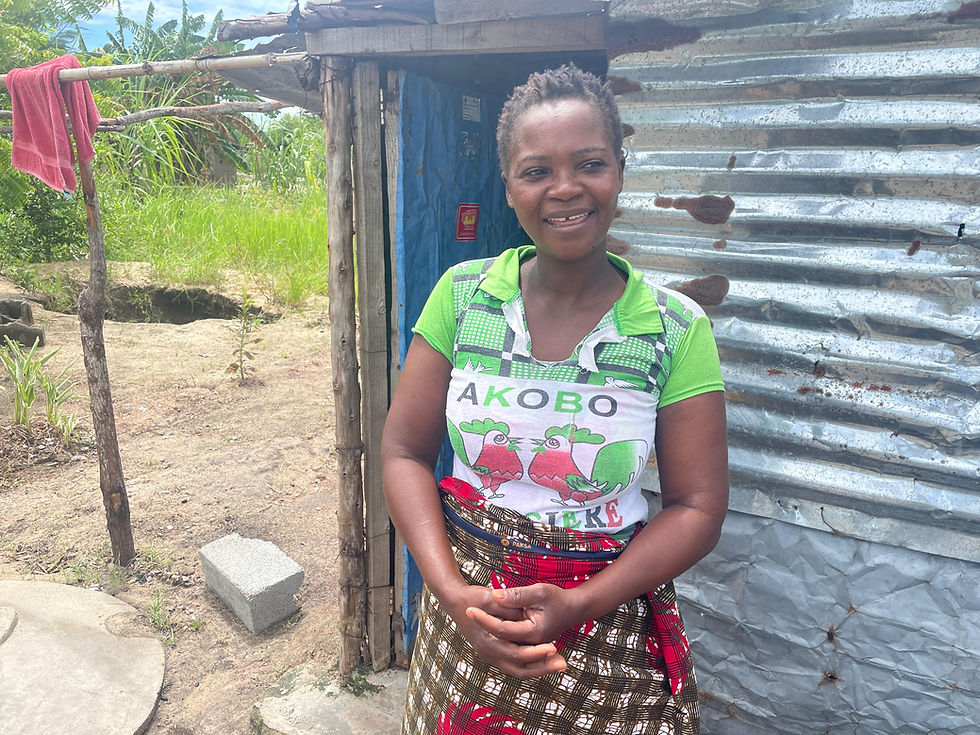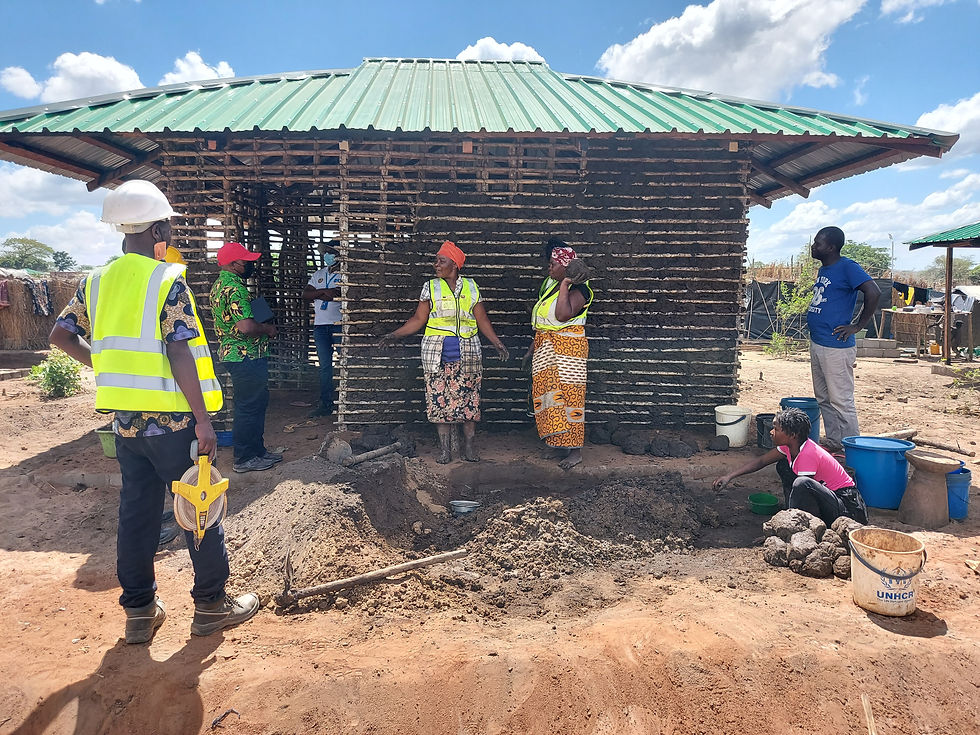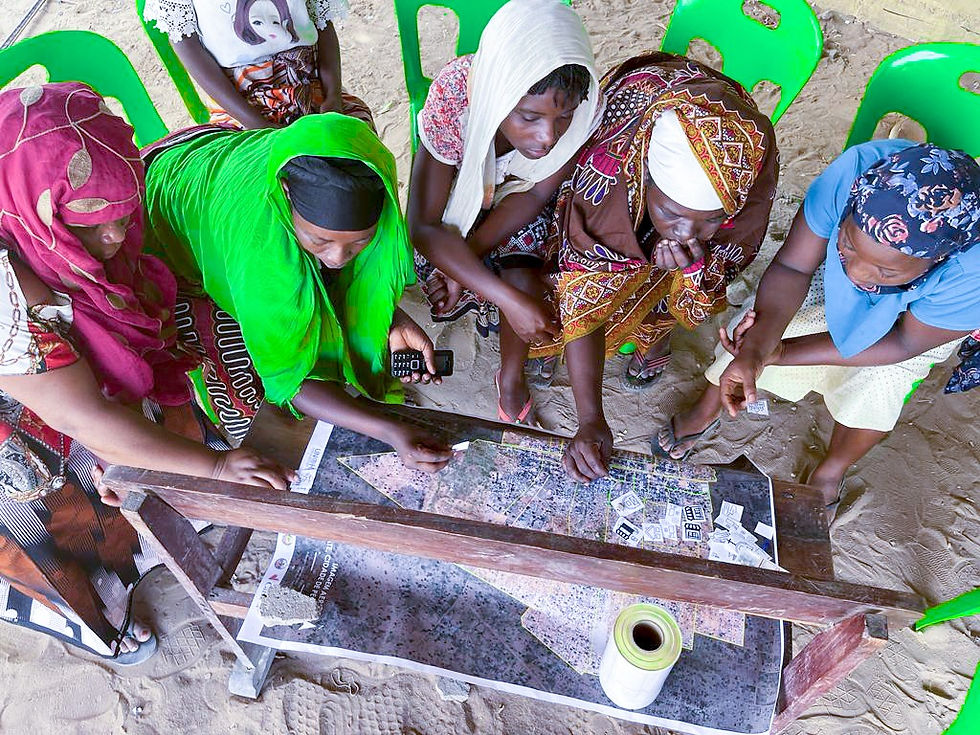
Mrs Arminda Guizado, a 39-year-old, Mother of 5 remembers the night of 16th March 2019 vividly as a day her life was shuttered with the loss of a home and livelihood due to Cyclone Idai in Dondo District, Sofala Province forcing her to seek alternative settlement in Mandruzi.
Like Arminda, millions of other urban residents have been affected by the frequent climate-induced disasters and armed conflicts in Central and Northern Mozambique. According to the Organisation for Migration (IOM), in its report released in January 2024, more than 600,000 people had been displaced in Northern Mozambique with Women and Children being more than 78%.
To strengthen the resilience of the resettlement of Mandruzi, Sofala Province, UN-Habitat is implementing the project “Building Back Better and Resilience Building: An integrated territorial approach In Sofala province” funded by the United States Agency for International Development (USAID). The project aims to enhance the resilience and recovery of communities in Sofala Province severely affected by Cyclones Idai and Kenneth.
So far, the project has benefited 5,800 Mozambicans through training in Climate Smart Agriculture (CSA), participation in Savings and Credit (S&C) groups, distribution of livestock such as ducks, and the supply of agricultural inputs through e-vouchers, among other initiatives that promote the resilience and sustainable development of communities in Sofala province.
Arminda found new hope through the project, she learned innovative agricultural production techniques, which sustained her self-sufficiency and increased her family’s livelihood. She is now managing a small business where she sells basic consumption goods.
“It was a difficult time, but today I'm happy because I have my own business. I've expanded into chicken farming. Now I need a bigger henhouse. My dream is to grow, to have better market space where I can put my chickens.” shares Arminda Guizado.
Arminda's story highlights the impact of community involvement in implementing a sustainability approach to disaster-induced displacement, even in areas of armed conflict. This was the case of Mrs. Maria Maurício Licumbe, who was forced to move from Muidumbe to Ancuabe district, Cabo Delgado province due to conflict.

Displaced women participating in the process of construction of gender-sensitive housing units in the resettlement village of Marokani, Cabo Delgado (UN-Habitat Mozambique, 2023)
Through the project “Women Peace and Security: Promoting Adequate, affordable, safe and resilient housing for Internally Displaced Women and girls in Cabo Delgado” supported by Norway and Iceland, Maria received training in resilient construction techniques, gaining new skills and a new perspective on life.
This project, supported by UN-Habitat, aims to empower displaced women through active participation in building their own homes, promoting resilience and social inclusion. Maria has become the leader of her women's group and a reference in her community, raising her self-esteem and guaranteeing new income opportunities.
“Now I see it as an activity that can generate income and bring development to our community.” says Maria Mauricio Licumbe, leader of a group of women artisans in the village of Marokani.
Maria is one of 33 artisans who have contributed to transforming the image of the resettlement village of Marokani through the implementation of resilient housing models, driving an approach of finding durable solutions on a neighborhood scale to accommodate internally displaced people.
In all, 40 women have already been trained and 50 resilient houses built in Marokani, pushing forward an approach of finding durable solutions on a neighborhood scale to accommodate internally displaced people.
Similarly, in Mahate, a neighborhood in the city of Pemba, Cabo Delgado, which is one of the local contexts with the highest rate of IDPs, the importance of ensuring social inclusion and durable solutions was also demonstrated.

Young women from the internally displaced and hosting community engaged in the construction activities of the new block for pediatric consultations in the Health Center of Mahate, Pemba City (UN-Habitat Mozambique, 2024)
Through the implementation of the Urban Durable Solutions initiative, which promotes the sustainable and gender-sensitive integration of IDPs in Pemba, joint planning between host and displaced communities and local authorities was made possible. Supported by the High Commission of Canada in Mozambique and the Swiss Agency for Development and Cooperation, the initiative has helped build capacities and implement concrete actions to improve the quality of life in these settlements.
Mr. João Pedro, secretary of the Mahate municipal neighborhood, also witnessed the process of community engagement from the diagnosis of the neighborhood's challenges to the development of an action plan translated into social infrastructure interventions at the neighborhood level.
"Through the project, we have built a laundry, health rooms and installed street lighting. Community participation is vital if we are to move forward," says João, encouraging more local engagement.
These stories illustrate the importance of "Community Engagement for Durable Solutions" and highlight the efforts made by the Government of Mozambique, led by the National Institute for Disaster Risk Reduction and Management (INGD) and supported by UN-Habitat to ensure that displaced people are at the center of the Durable Solutions Agenda.

Displaced women and girls contributing to the participatory assessment of the Mahate neighborhood (UN-Habitat Mozambique, 2023)
With additional support from the Internal Displacement Solutions Fund (IDSF), which was established to enhance the implementation of the Secretary-General's Actions Agenda on Internal Displacement, UN-Habitat, in collaboration with other UN agencies, aims to build on the aforementioned experience and scale it up. Integrating community engagement practices and tools into national and local policies, bridging urbanization and displacement processes to promote durable solutions.

Comments